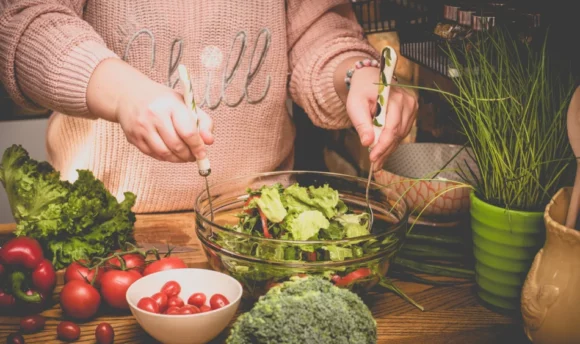How to Stop Food Cravings: 11 Handy Tips and Tricks
Find out how you can let go of cravings by following these simple steps

Whether you’re trying to lose weight or simply clean up your diet, food cravings can be your worst enemy. While some people crave sweet, sugary snacks and others processed salty foods, eating either of them excessively increases your calorie count.
As a result, you may struggle to maintain a healthy weight, which increases your risk of developing a range of chronic health problems, from high blood pressure to diabetes.
However, by making some small lifestyle changes, you can curb these cravings completely, making it much easier to reach your health and fitness goals.
To help you on your wellness journey, we’ve explored 11 simple strategies for keeping you full, reducing your appetite, and cutting those pesky cravings out of your life for good.
How to Stop Food Cravings? Identify the Cause First
Experiencing a craving means that you are having an intense longing for a specific type of food, which is extremely difficult to control.
Although cravings for candy, chips, or fast food can be triggered by hunger, they are often more of a mental desire, potentially caused by a variety of factors, including:
- Eating too little throughout the day
- Letting yourself get too hungry
- Failing to plan your meals
- Stress
- Sleep deprivation
- Boredom
- Low blood sugar
By putting some simple strategies into place, you can, therefore, prevent these things from happening and tackle cravings at their root cause.


“At risk of psychological distress, unhappiness, and discouragement, we can change our diets overnight and force ourselves out of food cravings. But did you know that part of the reason why it may be so difficult to resist these cravings is our gut bacteria?
For example, eating cheese-rich comfort food such as pizza may nurture a gut microbiome that has been linked to specific food preferences. Abruptly cutting out such foods may disrupt the gut microbiome, causing irritation and mood swings.
It would then be more optimal, both for us and our bodies, to make these changes gradually. Once our bodies get accustomed to the new way, it becomes easier to manage food cravings. ” — says Astrid Brojanowska, psychologist and academic teacher.
11 Ways to Reduce Food Cravings
Fed up with craving french fries or searching the cupboards for sugary snacks? Here are 11 things you can do to kill those cravings and make losing weight much easier:
#1 Drink enough water
Studies show that around 37% of people confuse thirst for hunger, often because the same part of the brain interprets both signals. This means that some of the signs of dehydration are similar to hunger symptoms, including fatigue, headaches, dizziness, and nausea.
Therefore, before grabbing a handful of chips between meals, the first thing that you should do when experiencing cravings is get a glass of water. Consuming water has been shown to reduce appetite and increase resting energy expenditure by 30%, so men should aim for around 15.5 cups and women 11.5 cups per day.
Drinking plenty of water each day also comes with a whole host of other health benefits, from maintaining smooth digestion to boosting skin health.
#2 Eat more protein
You may associate a high-protein diet with people looking to build muscle or gain weight. However, protein is an essential nutrient for making up virtually every tissue within the body, from skin and nails to muscles and bones, and also plays a significant role in regulating appetite.
While reducing levels of the hunger hormone ghrelin within your body, it also increases peptide YY, the hormone that signals when you’re full. So, by incorporating more protein into your meals, you’re more likely to feel satisfied after eating and less likely to experience cravings.
Some great protein sources include lean meats like chicken breast and turkey, fish, lentils, beans, cottage cheese, eggs, Greek yogurt, milk, and protein bars.
#3 Eat wholesome foods
If you’ve ever had cravings after consuming fruit juice or sugary carbonated beverages or eating cookies, processed meats, and fast food, this may be because these foods contain empty calories.
Foods with empty calories typically taste good, which makes us want to eat more of them once we’ve started. However, they are loaded with sugars and fats yet low in protein and fiber, meaning they won’t satisfy your appetite.
You’ll, therefore, need to eat more calories, which increases your risk of weight gain.
To prevent this, try to eat unprocessed, whole, healthy foods with every meal, such as fruits, vegetables, whole grains, and legumes.
These foods are low in calories, meaning you can eat bigger portions, and are packed full of fiber, an essential nutrient that slows digestion. Eating whole foods should keep you fuller for longer and prevent those pesky cravings.
#4 Drink some coffee
Coffee is loved for its energy-boosting properties, but did you know that it also works as an appetite suppressant? This is because it contains caffeine, a natural stimulant with thermogenic effects that may temporarily increase your metabolism and decrease your appetite.
These effects also mean that caffeine helps to burn fat, making coffee an ideal morning weight loss drink. Some studies show that coffee may slow the emptying of your stomach, keeping you fuller for longer, but there are mixed results on this hypothesis.
Furthermore, drinking coffee might increase levels of serotonin, a neurotransmitter and hormone that regulates mood, digestion, and appetite. However, you shouldn’t rely solely on coffee to curb those cravings, as consuming too much caffeine can cause insomnia, jitters, and anxiety.
#5 Plan your meals
One of the best ways of ensuring that you get plenty of appetite-satisfying, weight loss foods into your diet is by planning your meals for the week ahead. In fact, meal planning has been directly linked with lower chances of being overweight.
If you already know what you’re going to be eating each day, you’ll remove the element of indecision that often arises around meal times and leads to poor choices.
By having all of the ingredients that you need to prepare each meal, you’ll be less tempted to grab a quick, ready meal or takeout when hunger and cravings strike.
When meal planning, you should always ensure that you include enough food and calories in your daily diet to keep you full; otherwise, you’re more likely to wander off plan and overeat.
Try using a nutrition app, which can help you calculate your recommended calorie intake, come up with fun meal ideas, and keep you motivated to reach your health goals.
#6 Plan your snacks
As well as meals, planning your snacks and keeping them on hand is another effective method for preventing cravings. Having a healthy snack ready to go can stop extreme hunger, reducing the temptation to grab a candy bar or some chips when you’re short on time.
In terms of snack choices, try to choose low or zero-calorie foods such as celery, apples, strawberries, carrots, and watermelon.
Pair these with high-protein yogurt bowls or small amounts of healthy fats like peanut butter, nuts, and seeds, which will fill you up for longer and ensure that you don’t overeat at your next meal.
#7 Reduce your stress levels
If you find yourself craving takeouts, chocolate, or alcoholic beverages to get you through the day, this may be because of stress.
Whether due to work, family, or general life commitments, being stressed can lead to increased cravings, comfort eating, and a higher calorie intake. Intense stress also elevates your cortisol levels, a hormone that can cause weight gain in your midsection.
Try to reduce any stress-related eating behaviors by putting healthy habits into place. For instance, creating a solid daily routine and planning ahead keeps you organized and ensures that you’re able to prioritize the most important tasks.
This prevents you from having to multitask, which can leave you feeling overwhelmed, irritated, and more likely to turn to food as a comfort blanket.
#8 Get enough sleep
Ever noticed that your cravings for unhealthy foods become more intense when you’re tired? This is because fatigue caused by short sleep duration may increase levels of the hunger hormone ghrelin yet lower leptin levels, a hormone that works as an appetite suppressant.
As a result, you’re likely to have a bigger appetite and increased cravings when fatigued, which can lead to you choosing unhealthy convenience foods over balanced home-cooked meals that will keep you full.
With studies showing that those struggling with sleep deprivation are 55% more likely to be obese, it’s essential to get the recommended 7–9 hours of sleep per night.
#9 Practice mindful eating
Mindfulness is a type of meditation that involves being fully present in your surroundings. Practicing mindfulness can not only help lower stress levels, which may lower your cravings, but also tackle the symptoms of anxiety and depression, both of which can trigger overeating.
In relation to food, mindful eating encourages those who practice to become more aware of their emotions and eating habits, therefore teaching you how to distinguish between actual hunger and cravings.
It can also reduce your overall food intake, with one study finding that eating mindfully lowered the number of binge eating episodes per week significantly.
Make mindfulness a regular habit by being more present during meal times, avoiding distractions from devices, and chewing each mouthful properly. Using a journaling app is another easy way of integrating mindfulness into your daily life and tracking your cravings over time.


“Setting realistic goals is key when making adjustments to our diet. It’s often more effective to take many small but manageable steps rather than attempting a major change only to find ourselves returning to our previous habits.
We should remember that diet should not be associated with regret or some pain that we must overcome in order to look slim for summer vacation. Diet should be a conscious, healthy choice that is tailored to our individual needs.”
#10 Exercise
Research suggests that incorporating regular exercise into your weekly routine helps to improve cognition and increase function in the prefrontal cortex, the part of the brain responsible for reward. Both of these factors make it easier to limit the consumption of junk foods by reducing cravings.
Specifically, aerobic exercise like cycling or running has a significant impact on hunger hormones, which work to temporarily decrease your appetite.
Exercising has also been shown to protect against the negative emotional consequences of stress, which can cause your cravings for comfort food to increase.
If you’re a beginner, start building a regular exercise routine by setting some realistic goals, selecting a type of exercise that you enjoy, and creating a workout schedule that suits your lifestyle.
#11 Brush your teeth
For those who regularly find themselves craving something sweet after dinner, brushing your teeth immediately after eating could be the way forward.
As something we do regularly at night before bed, brushing your teeth often signals to your brain that it’s time to sleep, therefore naturally reducing your desire for more food.
Toothpaste that contains sodium lauryl sulfate, a detergent that foams in your mouth, also suppresses the sweet receptors of your taste buds. Plus, the minty flavor of the toothpaste will clash with all other flavors, meaning you’re unlikely to want to eat after bushing.
By the time this taste disappears, those sugar cravings will have had time to fade, and you may feel less obliged to rummage through your candy cupboard.
A Word From Our RD


You may feel like you’re eating less, but if you are still struggling to see weight loss results, you might need to look at the types of foods you’re eating.
For instance, if you’re frequently giving in to sugary or junk food cravings, you’re likely to be consuming many more calories than you think, which may be the reason for your plateau.
Try cutting down on these foods and instead include more high-fiber, low-calorie options like whole fruits, vegetables, seeds, and legumes in your diet.
If you’re still struggling to keep cravings at bay, you could try an appetite suppressant. However, these supplements aren’t ideal for everyone, particularly if you’re on any other medication, are pregnant, or are breastfeeding, so always consult your doctor first.
FAQs
If you’re finding yourself constantly craving greasy junk food, try not to let yourself get too hungry throughout the day. Fill up on high-protein, high-fiber foods, and always keep healthy snacks on hand. You should also plan your meals in advance so you’re less likely to grab a takeout after a busy or stressful day.
Craving sweet foods may be a sign that your blood sugar levels are low. Rather than choosing candy or cookies that will cause your levels to quickly spike and fall, which may leave you feeling tired and moody, try healthier options such as Greek yogurt, popcorn, or fruit.
Appetite-suppressing foods tend to be those that are rich in protein, healthy fats, and fiber. Some healthy examples include avocados, beans, legumes, lean meats, nuts, and seeds.
Conclusion
From failing to plan to letting yourself get too hungry, there are a variety of reasons why you may be experiencing food cravings. However, this also means that there are plenty of things you can do to curb these cravings and reach your health and wellness goals.
While choosing the right types of food is essential, you should also address other lifestyle factors, including your sleep quality, hydration, and stress levels, as these elements all play a role in food consumption.
If you’re struggling to feel full while on a weight loss journey, you may want to try a fiber supplement, which can leave you feeling satisfied and prevent those pesky cravings.

















































 Select your language:
Select your language: 







